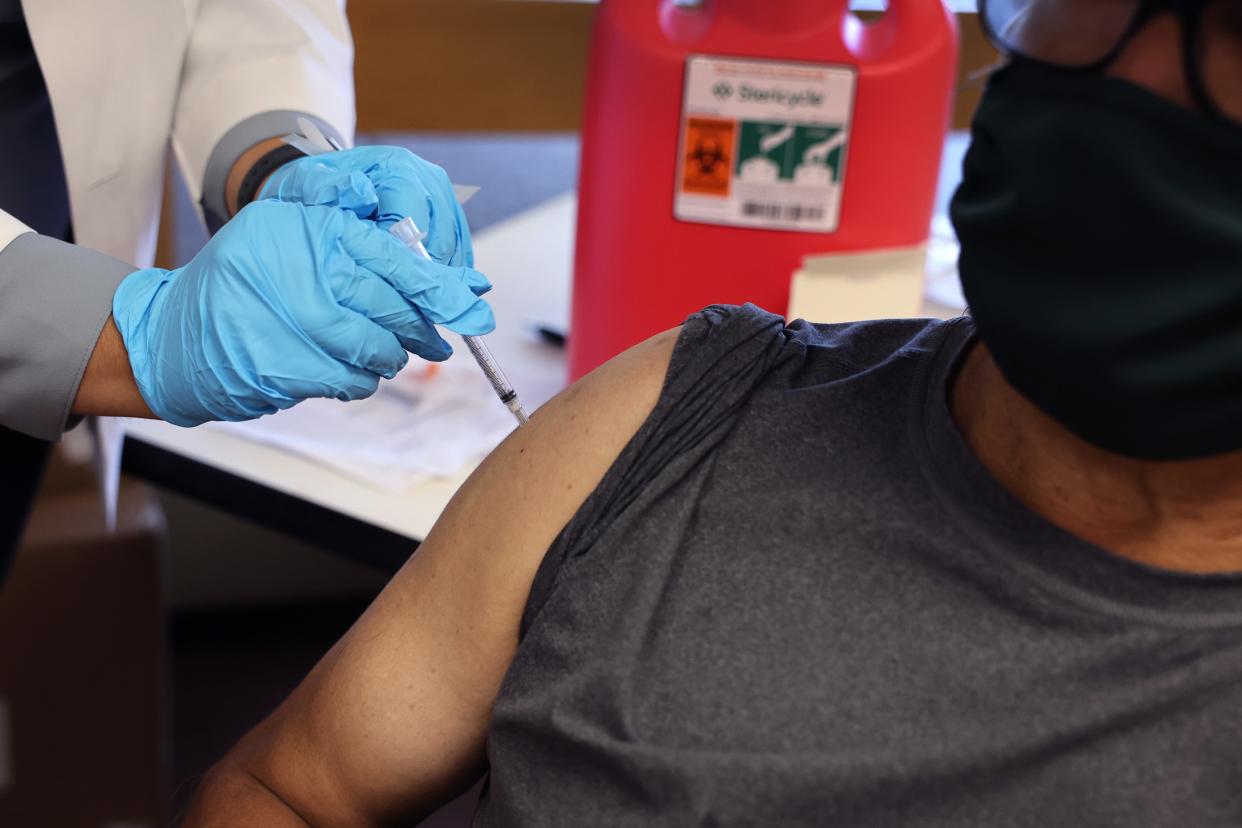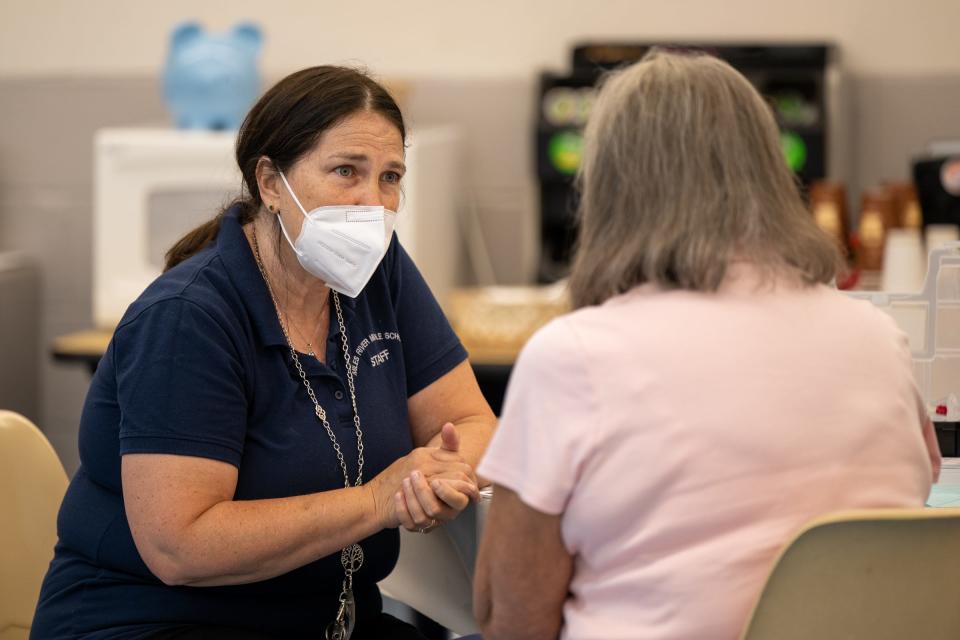Do we just not care about old people?

- Oops!Something went wrong.Please try again later.
The COVID-19 pandemic would be a wake-up call for America, advocates for the elderly predicted: incontrovertible proof that the nation wasn’t doing enough to care for vulnerable older adults.
The death toll was shocking, as were reports of chaos in nursing homes and seniors suffering from isolation, depression, untreated illness and neglect. Around 900,000 older adults have died of COVID-19 to date, and they account for 3 of every 4 Americans who have perished in the pandemic.
But the decisive actions that advocates had hoped for haven’t materialized.
Efforts to strengthen care quality in nursing homes and assisted living centers have stalled. Most people – and government officials – appear to accept COVID-19 as part of ordinary life. Many seniors at high risk aren’t getting antiviral therapies for COVID, and most older adults in nursing homes aren’t getting updated vaccines.
In the last week of 2023 and the first two weeks of 2024, 4,810 people 65 and older lost their lives to COVID-19 – a group that would fill more than 10 large airliners – according to data provided by the Centers for Disease Control and Prevention. But the alarm that would attend plane crashes is notably absent.
During the same period, the flu killed an additional 1,201 seniors and respiratory syncytial virus infections killed 126.
“It boggles my mind that there isn’t more outrage,” said Alice Bonner, 66, senior adviser for aging at the Institute for Healthcare Improvement.
Do we simply not care? Here's what veteran health care professionals, researchers and policymakers who are older themselves had to say.
The pandemic and ageism
Prejudice against older adults is nothing new, but “it feels more intense, more hostile” now, said Karl Pillemer, 69, a professor of psychology and gerontology at Cornell University.
“I think the pandemic helped reinforce images of older people as sick, frail and isolated – as people who aren’t like the rest of us,” he said. “And human nature being what it is, we tend to like people who are similar to us and be less well disposed to ‘the others.’”
“A lot of us felt isolated and threatened during the pandemic. It made us sit there and think, ‘What I really care about is protecting myself, my wife, my brother, my kids, and screw everybody else,’” said W. Andrew Achenbaum, 76, the author of nine books on aging and a professor emeritus at Texas Medical Center in Houston.
In an environment of “us against them,” Achenbaum continued, “who’s expendable? Older people – who aren’t seen as productive, who consume resources believed to be in short supply. It’s really hard to give old people their due when you’re terrified about your own existence.”

Combine the fear of diminishment, decline and death that can accompany growing older with the trauma and fear that arose during the pandemic, and “I think COVID has pushed us back in whatever progress we were making in addressing the needs of our rapidly aging society. It has further stigmatized aging,” said John Rowe, 79, a professor of health policy and aging at Columbia University.
“Everyone loves their own parents. But as a society, we don’t value older adults or the people who care for them,” said Robert Kramer, 74, co-founder of the National Investment Center for Seniors Housing & Care.
Kramer thinks boomers are reaping what they have sown: “We have chased youth and glorified youth. When you spend billions of dollars trying to stay young, look young, act young, you build in an automatic fear and prejudice of the opposite.”
Integration, not separation
“We separate ourselves from older people so we don’t have to think about our own aging and our own mortality,” said G. Allen Power, 70, chair in aging and dementia innovation at the Schlegel-University of Waterloo Research Institute for Aging in Canada. But the best way to overcome stigma is “to get to know the people you are stigmatizing.”
The solution: “We have to find ways to better integrate older adults in the community as opposed to moving them to campuses where they are apart from the rest of us,” Power said. “We need to stop seeing older people only through the lens of what services they might need and think instead of all they have to offer society.”
That is a core precept of the National Academy of Medicine’s 2022 report Global Roadmap for Healthy Longevity. Older people are a “natural resource” who “make substantial contributions to their families and communities,” the report’s authors write.
Those contributions include financial support to families, caregiving assistance, volunteering and ongoing participation in the workforce, among other things.
“When older people thrive, all people thrive,” the report concludes.
In classes he teachers, Kramer tries to convey the message that future generations will get their turn.
“You have far more at stake in changing the way we approach aging than I do,” he tells his students. “You are far more likely, statistically, to live past 100 than I am. If you don’t change society’s attitudes about aging, you will be condemned to lead the last third of your life in social, economic and cultural irrelevance.”
Anne Montgomery, 65, a health policy expert at the National Committee to Preserve Social Security and Medicare, believes that baby boomers can “rewrite and flip that script if we want to and if we work to change systems that embody the values of a deeply ageist society.”
Not all her colleagues are as optimistic. For himself and the baby boom generation, Kramer thinks it’s “too late” to effect the meaningful changes he hopes the future will bring.
“I suspect things for people in my generation could get a lot worse in the years ahead,” Pillemer said. “People are greatly underestimating what the cost of caring for the older population is going to be over the next 10 to 20 years, and I think that’s going to cause increased conflict.”
KFF Health News is a national newsroom that produces in-depth journalism about health issues and is one of the core operating programs at KFF – an independent source of health policy research, polling and journalism.
This article originally appeared on USA TODAY: Do we care about old people?

